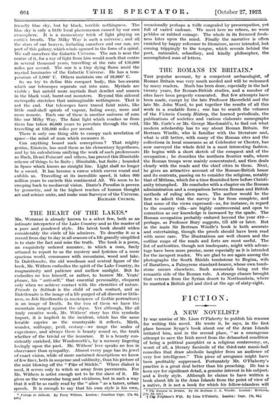THE HEART OF THE LAKES.*
Mn. WITHERS is already known to a select few, both as an intimate interpreter of the Lake Country and as the master of a pure and pondered style. His latest book should widen considerably the circle of his admirers. To describe it as a record from day to day in all seasons of a life grandly simplified is to state the fact and miss the truth. The book is a poem, an exquisitely ordered romance, in which a man, finely attuned to report to us the mystery and lyricism of a more spacious world, communes with mountains, wood and lake. In Dalethwaite, the old woodman and central figure of the book, Mr. Withers embodies the spirit of the Lake Country, its magnanimity and patience and mellow sunlight. But he embodies no less himself, or rather, to borrow Mr. Yeats' phrase, his " anti-self," that essential personality, eloquent only when we achieve contact with the eternities of nature. Friends in Solitude is the child of such contact, and as Dalethwaite is the image of a life purged of all discord or little- ness, so Job Hardknotts (a masterpiece of Gothic portraiture) is an image of Death. In the two of them we have the mountain ranged against the abyss. Yet although, like all truly creative work, Mr. Withers' story has this symbolic import, it is implicit in the incident, which has the same lovable caprice as the countryside it reflects. Mirth, 'wonder, soliloquy, peril, ecstasy—we range the scales of experience, and always there is beauty round us, the truth whether of the trivial or the immense. It is a beauty con- sistently enriched, like Wordsworth's, by a memory lingering lovingly upon the past. Mr. Withers' love speaks no less in observance than sympathy. Almost every page has its jewel of exact vision, while of more sustained descriptions we know of few finer, both in suspense and sublimity, than his picture of the mist blowing off the " Pike of Stickle." Where dialect is used, it serves only to witch us away from pavements. For Mr. Withers is artist enough not to be the slave of it. He gives us the vernacular tang and vividness, but in such a way that it will be as easily read by the " alien " as a tamer, urban speech. It is enough to say that his own style is his own, • Friends in Solitude. By Percy Withers. London : Jonathan Cape. [7s, 6d, Det.1
occasionally perhaps a trifle congealed by preoccupation, yet full of varied cadence. We meet here no echoes, no worn pebbles or rubbed coinage. The whole in its focussed fresh- ness bites upon the mind. Finally the narrative is often enriched by happy reference to literature, never intruded, but coming trippingly to the tongue, which reveals behind the poet, naturalist, schoolboy, and kindly philosopher, the accomplished man of letters.














































 Previous page
Previous page